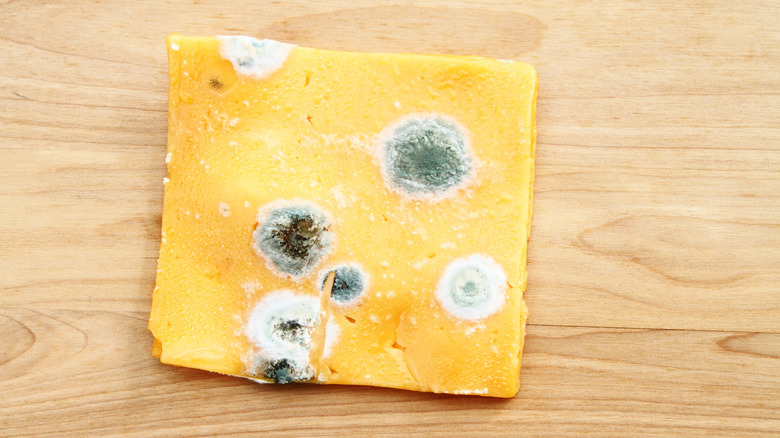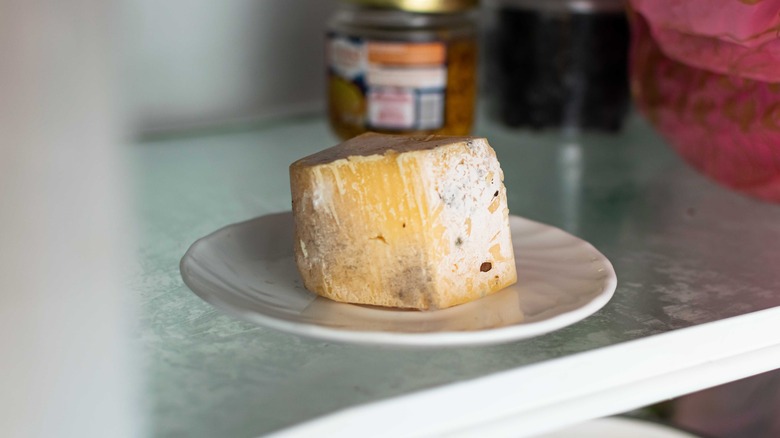What Happens If You Eat Expired Cheese?
Cheese and aging go hand-in-hand. It wouldn't be blue cheese without the mold, brie without the white rind, or parmesan without the 10 months of maturation. But there is a major distinction between safely aged cheese and cheese that has expired. Expired cheese can potentially harbor mold that is dangerous when consumed.
According to the USDA, moldy foods can cause allergic reactions and respiratory problems. If the mold has met the right conditions it can produce mycotoxins, a poisonous substance that can make you incredibly ill. Prevention adds that moldy foods can also harbor dangerous bacteria such as Listeria, Salmonella, and E. Coli. However, some cheeses are worse to eat after the expiration date than others.
If a hard cheese is sporting some mold, most of the time all you need to do is cut around the moldy part, plus an additional 1/8 to 1/4 an inch. But for soft cheese, on the other hand, surface mold isn't so easy to remove and is therefore not worth the risk. The Mayo Clinic states that in soft cheeses the mold can push mold threads throughout the entire soft cheese, making it dangerous to consume. In this case, you should discard the entire soft cheese.
What can happen if you consume expired cheese?
Consuming Listeria, Salmonella, or E. Coli can cause an array of symptoms in the body related to food poisoning. According to NHS, more mild symptoms of food poisoning include nausea or stomach cramps. If your food poisoning is more intense, you may be dealing with diarrhea, vomiting, chills, and fever.
While most of the time you can ride out these symptoms at home, in more extreme cases you should go to the nearest hospital. According to Valleywise Health, this is necessary if there is blood in your vomit or stool, green or yellow-colored vomit, severe dehydration, fever above 101 degrees, or if diarrhea lasts more than three days. If you begin to experience any of these symptoms call 911 or make your way to an emergency room.
Another possible reaction you may experience is an allergic reaction to the mold itself. In an article for Food Network, Toby Amidor, MS, RD explains that an allergic reaction from accidentally eating mold can cause respiratory problems. If you feel shortness of breath, you should seek immediate medical attention and call 911. This kind of flare-up can occur if you are allergic to mold.
What does expired cheese taste like?
As Gourmet Cheese Detective states, cheese undergoes changes in texture, taste, and smell as it ages, but these changes are not necessarily an indicator that the cheese has spoiled. Cheeses that are already sharp will only get sharper over time, and even mild goat cheese can both intensify in flavor and firm up. Despite the fact that cheese can look and taste differently than it did when you first purchased it, it should never resemble something other than food.
If it's emitting a toxic ammonia-like odor or is starting to smell like a barnyard, it's no longer safe to eat. The same goes for the taste. Spoiled cheese won't taste like cheese at all, and will actually cause the insides of your mouth to tingle, sometimes even burn. It's important to note that sometimes spoiled cheese will smell fine but taste bad, or vice versa, so the listed expiration date is usually the safest gauge for whether or not to toss it. Cheese is good, but it's definitely not worth getting food poisoning over.


